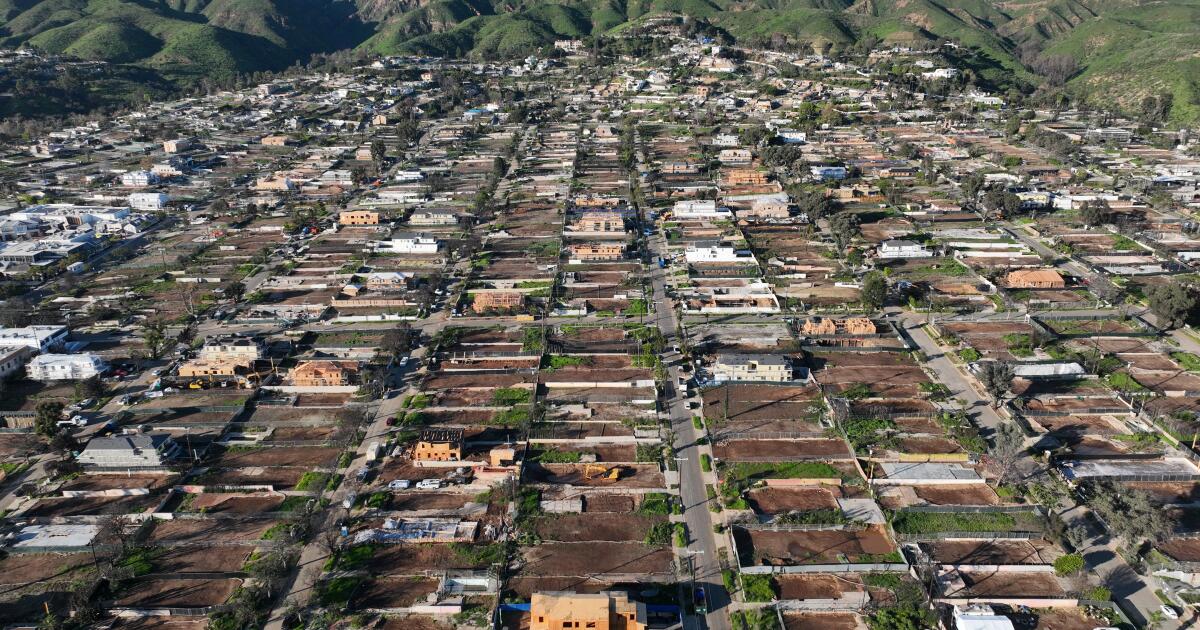Trump signs executive order to ‘preempt’ permitting process for fire-destroyed homes in L.A.
President Donald Trump has announced an executive order to allow victims of the Los Angeles wildfires to rebuild without dealing with “unnecessary, dupicative, or obstructive” permitting requirements.
The order, which is likely to be challenged by the city and state, claimed that local governments have failed to adequately process permits and were slowing down residents who are desperate to rebuild in the Palisades and Altadena.
“American families and small businesses affected by the wildfires have been forced to continue living in a nightmare of delay, uncertainty, and bureaucratic malaise as they remain displaced from their homes, often without a source of income, while state and local governments delay or prevent reconstruction by approving only a fraction of the permits needed to rebuild,” Trump wrote in the executive order, which he signed Friday.
The order called on the Secretary of Homeland Security and the Federal Emergency Management Agency to “preempt” state and local permitting authorities.
Instead of going through the usual approval process, residents using federal emergency funds to rebuild would need to self-certify to federal authorities that they have complied with local health and safety standards.
The order comes as the city and county approach 3,000 permits issued for rebuilding. A December review by The Times found that the permitting process in Altadena and Pacific Palisades was moving at a moderate rate compared to other major fires in California. As of Dec. 14, the county had issued rebuilding permits for about 16% of the homes destroyed in the Eaton fire and the city had issued just under 14% for those destroyed in the Palisades fire.
While Mayor Karen Bass did not immediately provide comment, the executive order drew intense pushback from Gov. Gavin Newsom.
A spokesperson for Newsom, Tara Gallegos, called Trump a “clueless idiot” for believing the federal government could issue local rebuilding permits.
“With 1625+ home permits issued, hundreds of homes under construction, and permitting timelines at least 2x faster than before the fires, an executive order to rebuild Mars would do just as useful,” Gov. Gavin Newsom wrote in a post on X, citing the number of permits issued solely by the city of Los Angeles.
Newsom said that the federal government needed to release funding, not take over control of the permitting process. The governor said that what communities really lack is money, not permits.
“Please actually help us. We are begging you,” Newsom wrote.
Instead of descending into the permitting process, Newsom called on the president to send a recovery package to congress to help families rebuild, citing a letter from a bipartisan delegation of California legislators that called for federal funding.
“As the recovery process continues, additional federal support is needed, and our entire delegation looks forward to working cooperatively with your administration to ensure the communities of Southern California receive their fair share of federal disaster assistance,” wrote the California legislators on Jan 7.
Some in the Palisades agreed that money was a bigger issue than permitting.
“When I talk to people it seems to have more to do with their insurance payout or whether they have enough money to complete construction,” said Maryam Zar, a Palisades resident who runs the Palisades Recovery Coalition.
Zar called the executive order “interesting” and said that it was fair of the president to call the recovery pace slow and unacceptable.
